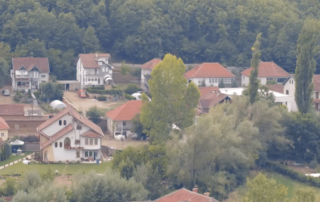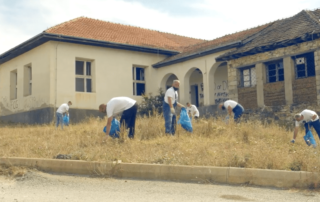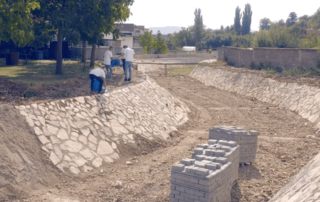Cernica is a village with around 600 inhabitants on the Kosovo side of the border with North Macedonia. The river with the same name running through the centre of the village makes it one of the most beautiful areas in the region but also one of those most vulnerable to floods. Fatlum Mehmeti from Cernica is proud of the natural beauty of his village and its hardworking population, but he adds that their life could be much better if they could just avoid the smell coming from the river because of the wastewater pouring into it, and damage caused by the floods. “Each and every autumn and winter, we lived in anxiety about the possible damage that the floods would cause to our houses, arable lands and lives,” he says.
“For many years now, the villagers have been lobbying the local authorities and our management to help them repair the riverbed so the impact of the floods could be decreased.”
Besim Haziri, Hidromorava public water company
No more floods
Besim Haziri from the Hidromorava public water company in Kosovo explains that floods have natural causes, albeit with considerable human impact as a result of climate change. However, in the case of Cernica and the region, the floods are also the result of a lack of proper infrastructure. “For many years now, the villagers have been lobbying the local authorities and our management to help them repair the riverbed so the impact of the floods could be decreased,” says Besim.
Although very willing to help, the company and local authorities lacked financial means and the expertise for this important project. An opportunity arose in 2019 when they found they could get support from the EU-funded cross-border cooperation (CBC) programme for Kosovo and North Macedonia. The Hidromorava company successfully applied together with Public Enterprise Vodovod Kumanovo, from the city of Kumanovo across the border. It was the beginning of a project they called “Substantial environmental and health benefits in cross-border area”, which would have a long-term positive impact on the lives of local residents.
Over two years, the project made some substantial infrastructure interventions. This included rearranging the riverbed and reducing soil contamination by separating wastewater and rainfall – all of which means that wastewater no longer flows directly into the river and also gets rid of the lingering smell. In addition, the project introduced some aesthetic changes by creating a promenade along the river and seating and recreational areas. Similar improvements were made on the other side of the border in the municipality of Kumanovo.
“Thanks to the EU support, now we don’t have to worry about the danger to our lives and our property from floods every winter.”
Fatlum Mehmeti, villager from Cernica

This much-needed funding came from an EU-funded cross-border cooperation project called “Preserving cultural landscape of Albania and Montenegro”. This helped the family to complete the renovation of the house while preserving its traditional cultural and historical elements. “The EU support was very important. In addition to money for the final renovation of the house, we also got support to promote our guesthouse through brochures and social media. This had an enormous impact on further growth of our business,” says Maja.
Maja and Milan now plan to continue this business for years to come. They also hope that at least one of their children will share their passion and keep the guesthouse open.
About the project
The EU-funded cross-border cooperation project “Preserving cultural landscape of Albania and Montenegro” started in 2018 and ended in 2020. The aim of the project was to enhance the competitiveness of the tourism sector by incorporating cultural and natural heritage. It contributed to promotion of the traditional architecture of the cross-border area among local and international visitors through exhibitions, social media, and a series of articles in targeted magazines on the topic of traditional elements in modern architecture and preserving cultural heritage. It was implemented by the Bjelasica, Komovi and Prokletije Regional Development Agency and the Polimski Museum from Montenegro in cooperation with EuroPartners Development and the Regional Council of Shkodër in Albania.
Source: web portal WeBalkans.eu







